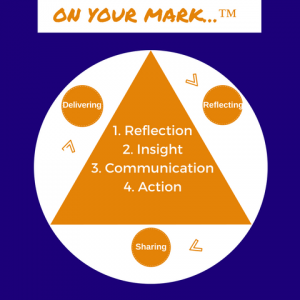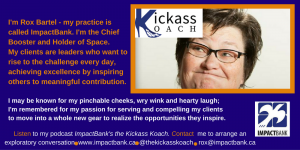Seeing around corners is essentially the focus of episode 096 of ImpactBank’s the Kickass Koach podcast. Last week we focused on reflection as a starting place – getting on your mark for success.
In my work with clients I use a variety of theories, models, and tools to help you raise your game ever higher to ensure you are always continuously learning as you are moving forward. I’ve brought two models together that often form the foundation of my work with transitioning leaders. It incorporates a three part repetitive cycle that fits into a four part process.

As you see in the rough drawing of the combined models, the three elements of the cycle are:
Reflecting – this is the time when a leader seeks perspective and a bit of distance
Sharing – this is the time when the leader socializes and tests her insights, seeking input from various sources
Delivering – this is the natural next step of acting on the insights
In the last seven episodes, 89 – 96 we’ve explored a leader’s challenge with falling prey to your own hubris, which just leads into an exploration of shadow. While it is critical for every leader to vigilantly observe and reflect on your own personal shadow, you have the added responsibility of remaining aware of the collective shadow and the possible challenges and opportunities that are lurking there.
Rhoda’s story was central to episode 91 and it may make sense to listen to both 091 and 092 before reading further. Today, in partnership with episode 096, I’m more interested in looking at what came between the two. Remember last week we talked about the importance of ‘foot off the pedal’ as you head into the curve: be reflective. Today – episode 096 – you are moving into that curve and the insights and data are flooding in.
You may recall Rhoda had 48 employees, 3 direct reports, and a regulatory, revenue, staff retention and cash flow mess that revealed themselves before she even got her bearings. Last week we discussed the importance of not reacting to the mess, just to prove yourself. For most of you, like Rhoda, this feels counter-intuitive. You want to roll up your sleeves and fix all the problems – show your new team what you are made of and what kind of leader you are. Well you may very well be sending all the wrong “kick-ass” messages.
Now Rhoda had already done all of that and it was back-firing on her as you heard in
episode 091. Partly for this reason, and to serve the needs of the business, we expanded the reflection time but co-created our own unique ideal way as outlined in episode 096.
Reflection and thoughtful observation is critical STILL, AND because we didn’t abandon it, Rhoda ultimately realized her fear of both the personal and professional risk in being too transparent with her team was warranted – we’ll dig into what she learned and how she adjusted in a later episode/post.
While, of course, in the reflection stage we explored her strengths, beliefs, inner critic before shifting to exploring what she wanted to accomplish in her new role and who she wanted to be as a leader in this position. Very quickly the conversations incorporated her reflections and observations about her team and the business. Once again she, like many of you, felt inclined to shake things up where she immediately recognized opportunities and arrived at clear conclusions. AND as she explored more closely, her inner drive to move to immediate action, she realized it was exactly what had gotten her in trouble in the past, prompting her to make the decision to remain in reflection stage longer – observing and unpacking. When she was ready to move into the curve, we co-created an approach to check her thinking and seek input from both data and facilitated interactions some of which included the entire team with an external facilitator and others that were private 1:1 conversations with a variety of members of her team, clients and board members.
Our conversations during this stage focused largely on what she was noticing and hearing. While the patterns took shape, I’d hold the space for her, supporting her thinking, acknowledging her insights, asking questions to broaden her awareness and ability to notice more clearly, we’d design next steps and monitor their impact and sometimes experiment with a few different ideas.
Overtime as she got to know the business thoroughly while nurturing relationships within the team, the profession, the regulatory bodies, the contracted ‘subject-matter-experts’, customers and members of the Board. She started to make connections and see patterns and in time she found herself moving adeptly through the four point model of:

- reflection – taking stock and seeking perspective; observing with distance to find your mark
- insight – seeking input and identifying relevant patterns, through a collection of data and facilitated interactions, as you Get Set for success;
- communication – engaging stakeholders by communicating openly to further test and develop your insights as you get Ready for implementation
- action – with all stakeholders involved, it’s GO TIME.
Rhoda later expressed gratitude that she had decided to stay in this second stage (a place to test and refine her thinking and related insights) a bit longer allowing her insights to be deeper and richer, maybe even more meaningful. In fact while she was preparing to shift into the third stage, she realized something that has proved an interesting lesson for us both – you can hear the story about the lesson in episode 096.
NEXT TIME: Now you’re on your mark, and all set to move forward but there is one more critical step before GO TIME….READY….don’t miss it.



